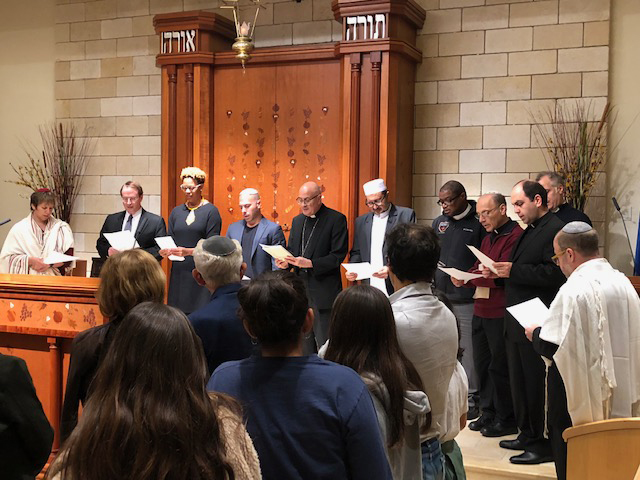American View
Feature
Answering the Call: Vigils Inspire Solidarity

Editor’s Note: The outpouring of support for the Pittsburgh Jewish community in the wake of the October 27 massacre of 11 individuals at the Tree of Life synagogue has been unprecedented. In Israel and around the world, in American cities big and small, on college campuses, at elementary schools, individuals have come together to grieve, to express solidarity, to gather as human beings to say #WeAreAllJews and we will not give in to hate. From coast to coast, communal and interfaith vigils have brought together people of all faiths.
At one such gathering, at Congregation Beth Am Israel, a Conservative synagogue in Penn Valley, Pa., a local pastor led a powerful physical act that was unlikely duplicated anywhere else. We encourage you to watch the video to the end.
The following is the author’s personal reflection of one such gathering in Brooklyn, N.Y.:
When my telephone rang Monday morning and I saw the number of my synagogue flash across the screen, I knew what it was going to be about.
I answered the call.
Our clergy assistant was on the other end. The call was a reminder about the memorial prayer service taking place that night, for those killed at the Tree of Life synagogue in Pittsburgh.
I had already decided to attend. The Brooklyn Heights Synagogue is my family’s home away from home. My husband, our 9-year-old daughter and I don’t require a calendar invite or a family discussion to decide if we’ll go to services. Every Friday night, our feet simply lead us to its sanctuary to observe Shabbat. Synagogue life is an integral part of our lives, just as it was for the Jews of Tree of Life who never made it home.
Most Friday nights, our members engage in friendly conversation as we enter the sanctuary and unwind from our week. But Monday was different. We were silent as we slowly walked in past the security officers—this night there were two rather than the usual one—with tears already beginning to form.
My daughter and I entered the sanctuary and took two of the last remaining seats as more and more people filed in, with more than 200 people quietly filling every inch of space.
Seated directly behind us were the Rev. Adriene Thorne from First Presbyterian of Brooklyn with her 8-year-old daughter, along with a bishop and several priests from local churches. Across the room, I spotted the imam from the Dawood Mosque; our congregation joins the mosque each year for Iftar, the customary meal eaten by Muslims after sunset during Ramadan. The presence of all those religious leaders reinforced the fact that this wasn’t just a tragedy for Jews, but for all human beings.
While Brooklyn Heights’ Rabbi Molly Kane lit a memorial candle from the bimah, Senior Rabbi Serge Lippe spoke of the individuals who lost their lives simply because they were Jews. He read the 11 names we by now all know by heart and explained that reciting the names are not enough. These names were people, Jewish people who woke up on Saturday morning and decided there was no place they would rather be than in the company of other Jews in the safety of their house of worship. He called them martyrs, a term we don’t often use, explaining: “American Jews tend to focus on the victims of the Holocaust as martyrs. In Hebrew we say it is someone who in their death sanctified God’s Name (al kiddush haShem). For Jews, our experience of martyrdom is the murder of innocent Jews solely for being and practicing Judaism.”
Pages with biographies of the 11 individuals, taken from the Pittsburgh Post-Gazette, were distributed. Among the victims were two brothers who remained inseparable throughout their lives. A couple that had been united in marriage, and now in death, all within the walls of Tree of Life. A Little League coach. A woman just three years shy of a century.
Lippe closed the service by inviting all the interfaith leaders up to the bimah to honor the lives that were lost as well as the entire Squirrel Hill community. They recited the Prayer of Saint Francis, also known as the Simple Prayer for Peace, known for its inclusive language and appeal to those of diverse faiths. “I couldn’t imagine being anywhere else Monday night but with our interfaith sisters and brothers,” shared Thorne.
Bullets have torn through the institutions that bring us together, that create the fabric of our society—schools and houses of worship, movie theaters, concerts and shopping malls. Yet our religion teaches us resilience. So we gather the courage to carry on and answer the call to come together and honor and remember those we have lost.










 Facebook
Facebook Instagram
Instagram Twitter
Twitter
Leave a Reply